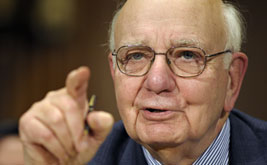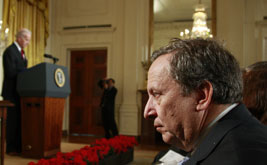
The Great Squid Hunt: On Matt Taibbi The Great Squid Hunt: On Matt Taibbi
In Griftopia Matt Taibbi argues that America has been corrupted by the merger of crime and policy, of stealing and government.
Dec 9, 2010 / Books & the Arts / Chris Lehmann
The Wachovia Whistleblower The Wachovia Whistleblower
Martin Woods had become an expert at spotting dirty money swilling around the banking system by the time he discovered his own employer—one of America's leading banks—was helping to launder the profits of drug-dealing in Mexico. Woods, from Liverpool, England, had become—as he puts it—"Dick Whittington, heading south to London, seeking fame and fortune." He worked in law enforcement for eighteen years, first as an officer and detective with the London Metropolitan Police's drug squad and then as a fraud expert with the National Crime Squad, equivalent to the FBI. For the latter, he worked on the British end of the famous Bank of New York money-laundering scandal in the late 1990s. In 2005 he joined Wachovia Bank as a money laundering reporting officer. Woods filed his first serious alerts during the 2006 Lebanon war, following up reports that Wachovia accounts were being used by Hezbollah. To his surprise, he was reprimanded for his attempts to freeze the suspect accounts. Later that year, he identified "a number of suspicious transactions" relating to Mexican casas de cambio (currency exchanges). There were deposits of traveler's checks with sequential numbers for large amounts of money—more than any innocent person would need—with inadequate or no identity information on them, and what seemed to a trained eye to be dubious signatures. Woods issued a series of "suspicious activity reports" (SARs) urging the blockage of named parties and large series of sequentially numbered traveler's checks from Mexico. To his amazement, one senior US manager in the Miami office, at which Latin American business was centered, called the reports "defensive and undeserved." Woods, as he puts it, "came under pressure from the business to change to develop a better understanding of Mexico." He was told to stop asking questions and to cease blocking suspicious transactions. "I said, 'I don't need to read up on Mexico. My interests are drug trafficking and money laundering.'" As it turns out, his instincts were exactly right. On April 10, 2006, soldiers from the Mexican military found 128 cases packed with 5.7 tons of cocaine, valued at $100 million, aboard a jet that had just arrived in the port city of Ciudad del Carmen. A twenty-two-month investigation by agents from the DEA, the IRS and others further revealed that the smugglers had bought the plane with money they had laundered through Wachovia. Between 2004 and 2007, the investigation found, billions of dollars in wire transfers, traveler's checks and bulk cash shipments had been funneled through Mexican exchanges into Wachovia accounts. On March 12 of this year, in a case filed by US Attorneys in Miami, the Justice Department charged Wachovia with the largest violation of the Bank Secrecy Act in US history. Five days later Wells Fargo—which purchased Wachovia during the 2008 crash for $12.7 billion, with the help of $25 billion in US taxpayer money—agreed to pay federal authorities $160 million. The settlement included a $110 million forfeiture representing "proceeds of illegal narcotics sales" and a $50 million fine for failing to apply the necessary antilaundering strictures to the transfer of a staggering $378.4 billion from Mexican casas de cambio (the money laundered through Wachovia was used to ship twenty tons of cocaine). In the early months of the investigation, Woods made contact with DEA officials through the US Embassy in London, after which the Federal Reserve and Office of the Comptroller of Currency, as Woods puts it, "spent a lot of time examining the SARs." In July 2007—while Woods "continued to face confrontation with US business colleagues"—about ten of Wachovia's casa de cambio clients stopped sending traveler's checks to London. "It appeared obvious they had been tipped off, now that the feds were on Wachovia's trail"—a suspicion he reported formally to the bank in May 2008. Instead of launching its own investigation, Wachovia hung Woods out to dry. In August 2008 the bank invoked disciplinary proceedings: serving a discipline letter and scheduling a hearing for alleged professional misconduct. A stinging reprimand claimed that Woods's actions could expose the bank to "potential regulatory jeopardy" and even "large fines." After bouts of illness, psychiatric counseling and an appeal to the Financial Services Agency in London under whistleblower protection laws, in December 2008 Woods filed a suit for harassment and detrimental treatment. The bank settled in May 2009 with an undisclosed payment. Woods was further vindicated by Wachovia's admission of failure in Miami, and by John Dugan, then comptroller of the currency for the US Treasury Department. In a letter dated March 19, Dugan told Woods he was "writing to personally recognize and express my appreciation for the role that you played in the actions brought against Wachovia Bank.... Without the efforts of individuals like you, actions such as the ones taken against Wachovia would not be possible." Despite his vindication, Woods—who now runs a consultancy that counsels banks on the dangers of laundering criminal money—remains bitter about the settlement of the Wachovia case, which amounted to a tiny fraction of the $12.3 billion the bank raked in last year. "All the law enforcement people wanted to see this come to trial," he says. "But no one goes to jail. In fact, everyone involved has either been promoted or gone to a better job at other banks. What kind of message does this give to the cartels and launderers? What does the settlement do to fight the cartels? Nothing.... Where's the risk? There is none—there is only an upside." Wachovia, it seems, had made this calculation quickly. "As early as 2004," the bank admitted in court, it "understood the risk." The alarm had been initially raised in London—and Wachovia had done all it could not to heed the whistleblower.
Dec 9, 2010 / Feature / Ed Vulliamy
WikiLeaks’ Economic Warfare WikiLeaks’ Economic Warfare
Bank of America shares fell 3 percent on Tuesday after Julian Assange hinted that he had as much as 5 GB worth of their documents revealing some shady behavior.
Dec 1, 2010 / Laura Flanders
Former Fannie Mae Lobbyist Tom Donilon to Become National Security Adviser Former Fannie Mae Lobbyist Tom Donilon to Become National Security Adviser
Why would President Obama, whose legacy has been sabotaged by a housing crisis that Tom Donilon helped create and conceal, hire him to run the most sensitive position of public t...
Oct 20, 2010 / Robert Scheer
Robert Scheer Takes Down the Architects of the Financial Crisis Robert Scheer Takes Down the Architects of the Financial Crisis
According to a review just published in the Los Angeles Times, Scheers new book breaks down the economic policy decisions that created the financial crisis, and calls out the men w...
Oct 18, 2010 / Press Room
Invasion of the Robot Home Snatchers Invasion of the Robot Home Snatchers
The Titanic that is the US housing market has just sprung its biggest leak.
Oct 13, 2010 / Robert Scheer
Hey Michelle, Read My Book Hey Michelle, Read My Book
Surely Michelle Obama knows that this administration has thrown trillions at the banks in hope that they would respond with mortgage relief for struggling homeowners—and got...
Oct 6, 2010 / Robert Scheer

The Big Guy’s on Our Side The Big Guy’s on Our Side
Paul Volcker, head of Obama's Economic Recovery Advisory Board, nailed the cause of our financial hardship in a series of blistering remarks on the sorry state of our economy.
Sep 29, 2010 / Robert Scheer
Larry Summers: Goodbye To All That Larry Summers: Goodbye To All That
The Devil we know certainly has friends. Time for other voices to be raised, loud, fast.
Sep 22, 2010 / Laura Flanders

So Long, Summers So Long, Summers
Finally! The announced departure of Lawrence Summers as the president’s top economic adviser is welcome news.
Sep 22, 2010 / Robert Scheer
